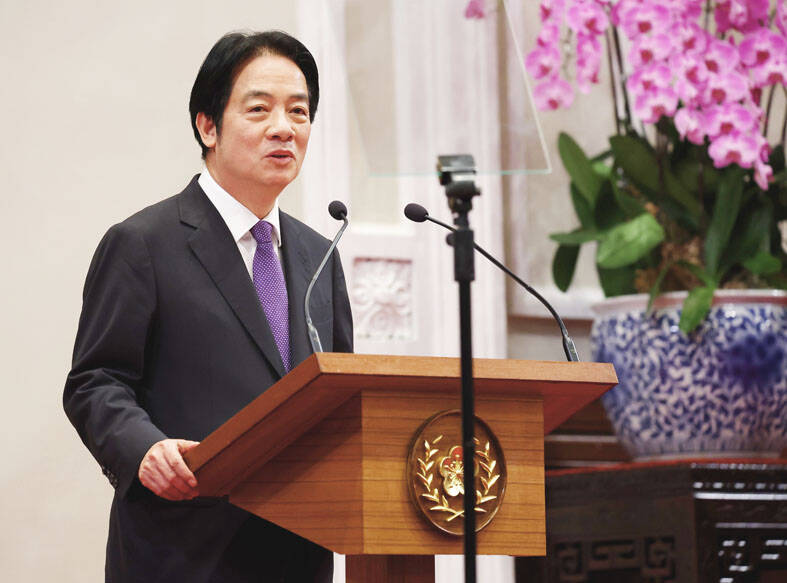President William Lai (賴清德) last night announced that his administration would make “four adjustments” — including a Cabinet reshuffle — to meet the public’s expectations.
Lai made the remarks at a news conference at the Presidential Office, following a referendum on the Ma-anshan Nuclear Power Plant and recall votes targeting seven opposition lawmakers.
The Ma-anshan plant was shut down after reaching the end of its operational life, in line with the Democratic Progressive Party’s (DPP) policy of phasing out nuclear power.

Photo: CNA
While “yes” votes outnumbered the “no” votes in yesterday’s referendum, the measure failed, as it did not secure the support of more than one-quarter of all eligible voters, as required by law.
Meanwhile, all seven Chinese Nationalist Party (KMT) lawmakers survived recall votes against them, in another setback in the DPP’s bid to flip control of the legislature.
Lai said that the Executive Yuan would carry out changes in Cabinet officials to improve governmental efficiency and ensure the public benefits from the administration’s policies.
The reorganization would reflect a shift in the government’s priorities toward the economy, democracy, livelihood issues, disadvantaged groups and young Taiwanese, he said.
The Cabinet would also change how it interacts with lawmakers, aiming to foster constructive dialogue between ruling and opposition parties without compromising on matters of national interest, he added.
The nation must adjust its fiscal structure to enhance sustainability and long-term economic development, which is a goal shared by the government and the opposition, Lai said.
Taiwan is engaged in tariff negotiations with Washington and is reconstructing regions hard-hit by the summer’s storms and torrential rains, which call for special and supplementary budgets, he said.
Against this backdrop, Lai said that although Premier Cho Jung-tai (卓榮泰) has repeatedly expressed his intention to resign since July 26, he has urged Cho to remain in office to oversee these critical responsibilities.

CHAOS: Iranians took to the streets playing celebratory music after reports of Khamenei’s death on Saturday, while mourners also gathered in Tehran yesterday Iranian Supreme Leader Ayatollah Ali Khamenei was killed in a major attack on Iran launched by Israel and the US, throwing the future of the Islamic republic into doubt and raising the risk of regional instability. Iranian state television and the state-run IRNA news agency announced the 86-year-old’s death early yesterday. US President Donald Trump said it gave Iranians their “greatest chance” to “take back” their country. The announcements came after a joint US and Israeli aerial bombardment that targeted Iranian military and governmental sites. Trump said the “heavy and pinpoint bombing” would continue through the week or as long

TRUST: The KMT said it respected the US’ timing and considerations, and hoped it would continue to honor its commitments to helping Taiwan bolster its defenses and deterrence US President Donald Trump is delaying a multibillion-dollar arms sale to Taiwan to ensure his visit to Beijing is successful, a New York Times report said. The weapons sales package has stalled in the US Department of State, the report said, citing US officials it did not identify. The White House has told agencies not to push forward ahead of Trump’s meeting with Chinese President Xi Jinping (習近平), it said. The two last month held a phone call to discuss trade and geopolitical flashpoints ahead of the summit. Xi raised the Taiwan issue and urged the US to handle arms sales to

State-run CPC Corp, Taiwan (CPC, 台灣中油) yesterday said that it had confirmed on Saturday night with its liquefied natural gas (LNG) and crude oil suppliers that shipments are proceeding as scheduled and that domestic supplies remain unaffected. The CPC yesterday announced the gasoline and diesel prices will rise by NT$0.2 and NT$0.4 per liter, respectively, starting Monday, citing Middle East tensions and blizzards in the eastern United States. CPC also iterated it has been reducing the proportion of crude oil imports from the Middle East and diversifying its supply sources in the past few years in response to geopolitical risks, expanding

Pro-democracy media tycoon Jimmy Lai’s (黎智英) fraud conviction and prison sentence were yesterday overturned by a Hong Kong court, in a surprise legal decision that comes soon after Lai was jailed for 20 years on a separate national security charge. Judges Jeremy Poon (潘兆初), Anthea Pang (彭寶琴) and Derek Pang (彭偉昌) said in the judgement that they allowed the appeal from Lai, and another defendant in the case, to proceed, as a lower court judge had “erred.” “The Court of Appeal gave them leave to appeal against their conviction, allowed their appeals, quashed the convictions and set aside the sentences,” the judges